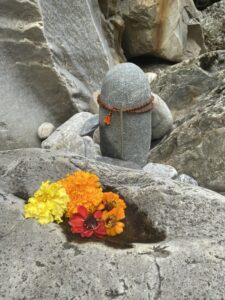Tulsi Dass, best known as the author of a popular version of the Indian epic, Ramayana, was a great believer in the potency of the practice of japa, repetition of the names of God, as a method of spiritual accomplishment. So great was his faith, it is said he cured people of their diseases by praying and simply saying, “Rama,” the name of the hero and namesake of the Ramayana, who many believe to be an incarnation of God.
Tulsi Dass had a son named Tarak, who followed in his fathers footsteps and also became an accomplished yogi through faith in the repetition of God’s names. Once a group of lepers came to Tarak and asked him to heal them of their disease. The young man prayed deeply and quietly said, “Rama, Rama.” Lo and behold, the lepers were cured!
Some bystanders who witnessed this miracle ran to Tulsi Dass and described the great deed performed by his son. Tulsi Dass, however, did not respond in the manner they expected. Rather than being proud, he hung his head and muttered, “After all my teaching, my son disgraces me.” The astounded bystanders asked Tulsi Dass how, in what possible way, had his son failed him? Tulsi Dass replied, “Alas, my son’s faith is so small that he found it necessary to repeat ‘Rama’ twice.”
In the yoga tradition, the nature of faith is described as being two-fold. First, one must hold on to God like a baby monkey clings to its mama. The little one hugs his mother so tightly that he is virtually joined with her and is never alone in the vast jungle. She can even swing on vines, so long as he maintains his grip he will be secure. Second, one need feel that he is like a baby lion cub near his mother. As a cub, his life is one of play and adventure, the mother lioness is responsible for watching him and keeping him safe. If he wanders into danger, it is she who must pick him up by the scruff of the neck and return him to safety.
In the example of the baby monkey, the aspirant is guided to remain steadfast in devotion and spiritual practice. He is to be disciplined and firm in his commitment to spirituality if he wishes to remain safe in the world and mature spiritually. In the illustration of the lion cub, the yogi is taught to be light-hearted and carefree, for it is God who is responsible for his well-being and spiritual development. These two bhavas, spiritual attitudes, may appear to be distinct and contrary, but on closer examination we find that they are complimentary.
I recently had an experience in which my faith was sorely tested and I found it necessary to contemplate both the baby monkey and the lion cub. My wife, Ambika, our six year-old son, Jahnu, and I arranged to travel from our home in Vermont to my in-laws in Colorado. We awoke at 4:30am to catch an early flight that would bring us to their doorstep in the middle of the same afternoon. To make a long story short, after delays, cancellations, thunderstorms, an unplanned overnight in Washington, D.C., and various mechanical problems including having to deboard a plane because a foul smell lead the crew to believe there might be a fuel leak, we arrived at our destination a mere 46 hours later. We could have driven to Colorado in that time. I don’t mean to be melodramatic, but those of you who have had similar experiences with airports, especially if traveling with a young child, might appreciate how we felt like we had entered some horrible twilight zone in which nothing ever goes right, or may ever go right again.
When we arrived in Colorado, I tucked my wife and exhausted son into bed and then went to sleep myself. I only slept for a few hours, however, before waking up feeling miserable. My nervous system was taxed and I had hardly eaten or slept for two days. I got out of bed and thought to myself, “This is the worst I have felt in years.” I am used to a peaceful lifestyle, absorbed in yoga and the beauty of Vermont’s Green Mountains, not the bustle of commuter life. I realized I had become somewhat spoiled, feeling immune to the bumps and bruises of modern life. Well, I had gotten walloped around pretty good the past two days and I was spent.
I did the only thing I know how to do in such situations, I sat down on the floor to pray and meditate. I knew I needed to ignore my throbbing head, aching back, and burnt-out nerves. Like a baby monkey I needed to cling to my meditative focus and not be distracted. In addition, like a lion cub, I needed to free myself of self-concern and trust that the practices and blessings could heal me.
I sat for a period of time, then did some yoga. As the sun rose in the morning sky through the window in my room, I also dawned with a new vigor. I could hardly believe it, I felt great. Not just good, great. I thought to myself, “This stuff really works!”
If it sounds funny to you as a reader that a committed yogi would be surprised his practices produced such positive results, it sounded even funnier to me as the thinker. The main feeling, though, was the contrast between how awful I had felt when I awoke, and then after practice, how terrific. It was like a switch had been turned on in my being and my inner light had come back on, quickly, remarkably, at full force.
I had to admit that I had become complacent, feeling pretty darn good had become my norm. I had taken the powerful and healing practices of yoga for granted. Really hitting the skids, though, reminded me of the incredible gift that is yoga and how grateful I am to have been instructed by my teachers. Since that morning, my faith in the power of yoga has been amplified and, even more significantly, I find myself feeling more compassionate towards people who are experiencing the pressure and stress of modern life. I feel more committed to sharing with them the healing art and science that is the yoga tradition.
Few of us have the faith of Tulsi Dass and Tarak. Most of us are still in the school of spiritual development, yet to graduate from our fears and self-centeredness. In fact, perhaps we can best enjoy our position by viewing ourselves through the lens of being students. There is a well-known phenomenon in high schools whereby the seniors, as they approach graduation, become increasingly fun-loving. Jokingly known as “senioritis,” the kids feel their remaining time in school is for finishing up their lessons, yet keeping plenty of time available for friends and merriment.
Those of us who are committed to our spiritual path might adopt a similar attitude, a sort of “spiritual senioritis.” With the faith of a baby monkey, we hang tightly to the teachers and teachings of our traditions while we finish our remaining spiritual education in the world. At the same time, with the faith of a lion cub, we frolic on this beautiful planet, secure that we are being protected and nurtured. We attend to our responsibilities as adults while maintaining a child-like innocence and a willingness to appreciate all that life offers. Modern living may still provide a shake or two at times, in airports and other places, but through faith we can continue on our spiritual journey while feeling our very best.




